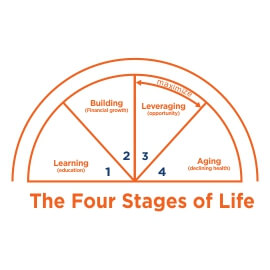- 77999 88416- Bhanur | Tarnaka
-

Life is the period between birth and death in which we can mould ourselves. There are four main stages in our life. They are as follows.
1.MIMICRY : We were born helpless we can't walk, can't talk, can't feed ourselves, can't even do our own things. As children, the way we are wired to learn is by watching and mimicking others. First and foremost, we learn physical skills like walking and talking then we develop social skills by watching mimicking our peers around us. Then finally in late childhood, we learn to adapt to our culture by observing the rules and norms around us and trying to behave in such a way that is generally considered acceptable by society. The adults in the community around us help us to reach this point supporting us to make right decisions .
2.DISCOVERERS : In the first stage, we learn to fit in with the people and culture around us. Stage two is about learning what makes us different from the people and culture around us. It requires us to begin making decisions for ourselves, to test ourselves, and to understand ourselves as to what makes us unique. It is a process of self-discovery. We try things. Some of them go well. Some of them don't. We need to know that there are certain limitations. Our time on this planet is limited and therefore we should spend it on things that matter the most.
3.COMMITMENT : Once you have pushed your own boundaries and found your limitations, then you are left with an understanding of “What actually is important to you” and “What is not”. Now, it's time to decide ourselves of one's life to let go the people who are draining you and holding you back. Then you narrow down on what you are best at and what is best to you. The most important activity is to go on with a single mission in life.
4.LEGACY : People arrive into stage four having spent somewhere around half a century investing themselves in what they believed was meaningful and important. Worked hard, earned enough, may be started a family or a charity or a political or cultural life and they are done. They have reached the age where their energy and circumstances no longer allow them to pursue their purpose any further. It is important physiologically because it makes the ever growing reality of one's own mortality more bearable.
CONCLUSION: “I have learned that no matter how much I care, some people just don't care back. I have learned that you can't make someone love you, all you can do is be someone who can be loved. The rest is up to them. Never regret a day in your life”.
G. RAHUL REDDY – MEC
